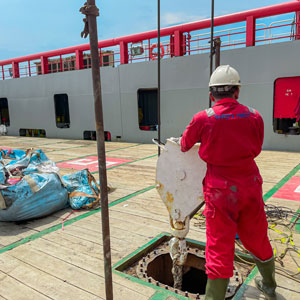How To File A Maritime Injury Claim In Louisiana: A Step-By-Step Guide

While personal injury law is often associated with car and truck accidents, in Louisiana, we cannot overlook another significant source of injuries: our waterways. Whether it’s our lakes, rivers, or the Gulf of Mexico, accidents on the water can lead to serious injuries. If you’ve been hurt on the water in Louisiana, this article will walk you through the basics of seeking financial compensation, including:
- How maritime personal injury claims differ from traditional land-based accident claims.
- How the Jones Act can help you recover financial compensation from your employer.
- How employers and insurance companies try to stop your claim (contact an attorney right away!)
What Is A “Maritime Injury,” And How Does It Differ From Other Personal Injury Claims?
A maritime injury generally involves accidents that happen on the water or on a vessel. Unlike standard personal injury claims, maritime injuries are influenced by several factors, including where the accident occurred, who was injured, and their relationship to the vessel and the employer. These factors can affect what laws apply and how a claim should be pursued.
For example, the type of worker—whether they are a seaman, a maritime worker, or even a recreational boater—can determine the legal framework under which the claim is filed. Maritime law is complex and often requires a deep understanding of specific rules related to the location of the injury (whether it happened in open waters or on certain navigable waterways) and the person’s role in relation to the vessel and commerce. Sometimes, even the difference between being a shrimper or a fisherman can matter!
What Is The Jones Act, And How Does It Apply To My Claim?
The Jones Act is a federal law that provides protection for seamen who are injured while working on a vessel.
To qualify as a seaman under the Jones Act, a person must spend a significant amount of their working time on a vessel or multiple vessels owned by the same employer. Whether you’re the captain, a deckhand, or even a cook on board, if you work in service of the vessel, you may be covered under the Jones Act.
What sets the Jones Act apart from other types of worker injury laws is that it allows you to sue your employer for negligence. In most other injury cases, such as workers’ compensation claims, you cannot sue your employer for their negligence, and your recovery is limited to certain benefits.
However, under the Jones Act, if your employer fails to provide a safe working environment or acts negligently—such as ignoring dangerous weather conditions—you can seek compensation not just for lost wages and medical bills, but also for pain and suffering and loss of enjoyment of life, which are not typically covered under workers’ compensation.
Additionally, under general maritime law, employers have an obligation to provide “maintenance and cure.” This means they must cover your daily living expenses (maintenance) and medical bills (cure) if you are injured, regardless of fault. This obligation is separate from the Jones Act but often works in tandem with it. Maintenance payments can range from $50 to $100 a day, but they don’t include lost wages.
It’s crucial to act quickly in maritime injury cases to preserve evidence, gather witness statements, and strengthen your claim for maximum recovery.
How Long Do I Have To File A Maritime Injury Claim?
Under the Jones Act, you have three years from the date of the accident to file a lawsuit against your employer or a vessel owner for negligence.
What Common Defenses Are Used By Employers In Maritime Injury Claims?
Employers often use specific defenses in maritime injury claims, particularly under the Jones Act. One of the most common defenses is based on a case called McCormick, which allows employers to avoid liability if the injured employee was not truthful during the hiring process.
If an employee fails to disclose a pre-existing condition or injury on their job application, and then suffers an injury to the same body part while working on a vessel, the employer may not be required to compensate for that injury, even if they were otherwise at fault.
This defense highlights the importance of being completely honest about your medical history when applying for maritime jobs. Failing to do so could jeopardize your ability to recover compensation if you’re injured on the job.
For general maritime law claims involving maintenance and cure, however, there are far fewer defenses available to employers.
If you are injured or become ill while in service of the vessel, the employer is typically obligated to pay for your daily living expenses (maintenance) and medical care (cure), regardless of who was at fault or how the injury occurred. Even contracting an illness, like pneumonia, while working on a vessel can entitle you to these benefits.
How Long Does It Take To Resolve A Maritime Injury Claim?
The timeline for resolving a maritime injury claim can vary. In some cases, the claim is settled directly with the employer’s insurance, which can speed up the process.
If a settlement cannot be reached, however, litigation (a lawsuit) may be necessary. Unfortunately, cases that escalate to litigation often take longer, and the time frame depends on many factors, including the complexity of the case and the court’s schedule.
Maritime injury claims are often filed in federal court, which generally moves cases faster than state courts, but even federal cases take time. The goal is not necessarily to resolve the case quickly, but to ensure that it is resolved fairly.
It’s important to fully understand the extent of your injuries and your long-term recovery before settling the case, especially in physically demanding jobs where an injury might prevent you from returning to work. This careful approach ensures that you are protected both in the short term and for the future.
Have You Been Injured While Working On A Ship Or Another Vessel On The Water?
For more information on Maritime Injury Claims In New Orleans, Louisiana, an initial consultation is your next best step. Get the information and legal answers you are seeking by calling (504) 254-4400 today.

Attorney Cheryl Wild-Donde’Ville is a talented lawyer based in Louisiana who has helped countless clients just like you navigate personal injury claims and the nuances of maritime law. Her guidance is grounded in the very latest in personal injury law and perfectly adapted to help you obtain compensation for accidents on land or sea.
Have questions about personal injury law at sea? Contact Waltzer Wiygul & Garside today to schedule an initial consultation.
Here to Support You Through the Legal Process. Contact Us at (504) 254-4400